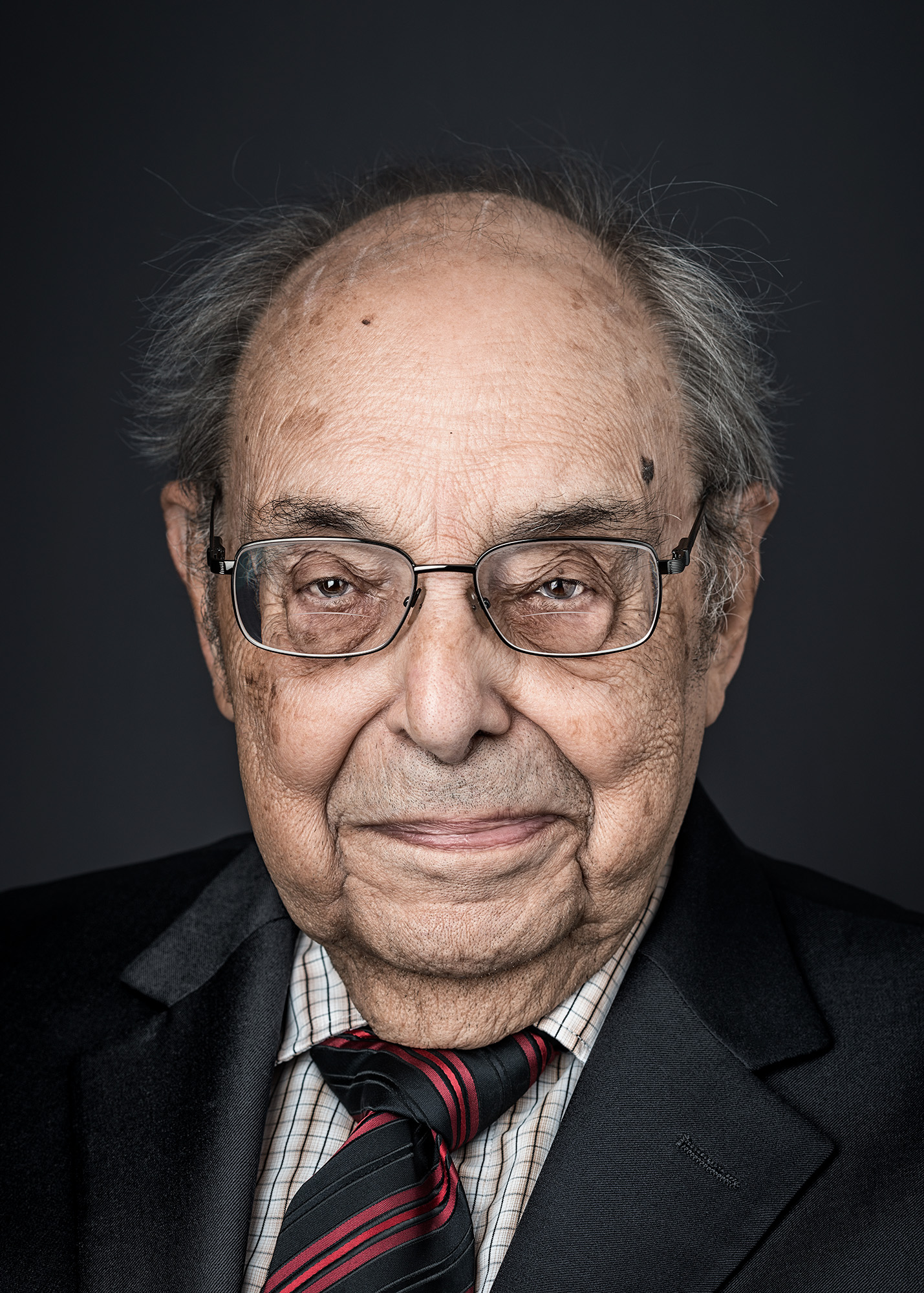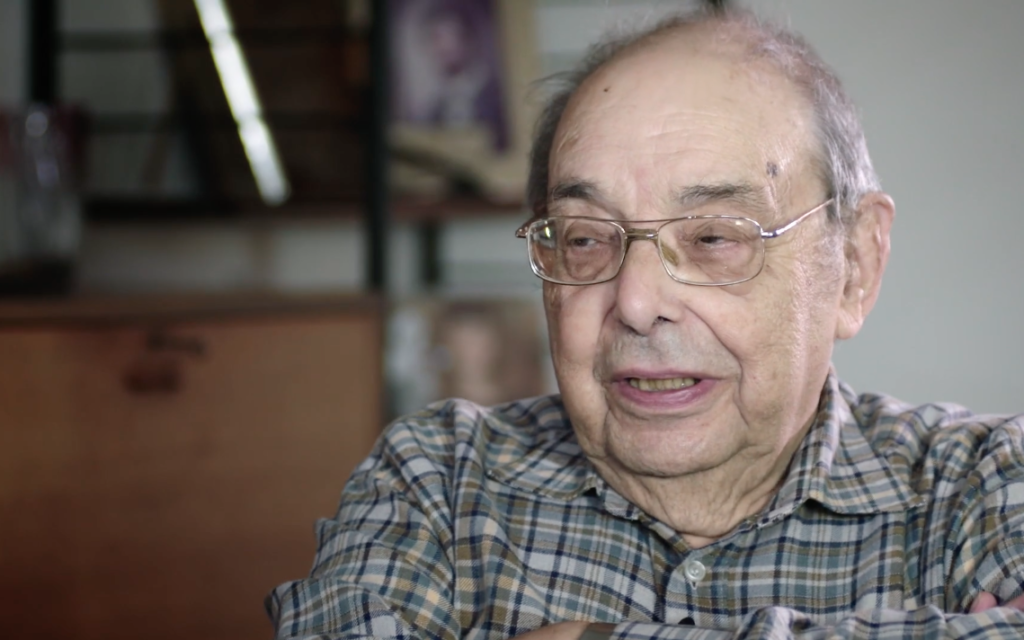Tributes to ‘wonderful, jovial’ refugee, who inspired survivors to make aliyah
Herbert Haberberg, who has died aged 96, spoke Yiddish to destitute survivors after the Shoah, convincing them to move to the new Jewish state.
Heartfelt tributes have been paid to a remarkable kindertransport refugee who supported survivors of Belsen in the aftermath of the Holocaust.
Shoah educators paid respects to Herbert Haberberg, 96, who used his Yiddish to convince destitute victims of the Nazis to move to the young Jewish state.
Born in Germany in 1924, he arrived in the UK on the Kindertransport aged 14, with his younger brother Manfred, but the two were separated and only able to see each other every six months.
Get The Jewish News Daily Edition by email and never miss our top stories Free Sign Up
While Herbert learned English and Yiddish fluently, Manfred, aged six in 1938, forgot how to speak German.
By 1941 Herbert moved to London, before joining the British Army in 1944 as part of the Jewish Brigade, fighting the Nazis in Italy, before being moved to Brussels, and then to Hamburg.
Last year, to mark the 75th anniversary of the liberation of Bergen-Belsen, Herbert told Jewish News how he worked with “the wonderful Jewish Relief Unit”, an arm of Jewish Committee for Relief Abroad, which was set up by World Jewish Relief, to support Belsen survivors after the Holocaust.

Herbert, said he joined the army “to fight the Germans”, but by 1946, was still in uniform and was stuck in a records office in Hamburg. By chance a Church of England clergyman suggested he should meet the Unit.
He told Jewish News: “The Jewish Relief Unit had one great drawback — almost none of them spoke Yiddish.” Herbert spent weekends at the camp, witnessing the “abysmal conditions”, including a rampant typhoid infection.
He said: “The British government didn’t want to know, and their main idea was to prevent these people getting in to [mandate] Palestine”.
He used his Yiddish to persuade the survivors to go to southern Europe and board the illegal ships to Mandatory Palestine. “These people were frustrated, demoralised, they felt they had no future. So going to what became the state of Israel… it was a good choice”, he said.
Karen Pollock, chief executive of the Holocaust Educational Trust said: “After learning about the existence of Bergen Belsen concentration camp, he spent the next couple of years volunteering his free time as a Yiddish interpreter for the Jewish survivors in the Belsen Displaced Persons camp, encouraging many of them to emigrate to the fledgling State of Israel.”
He was a wonderful man, with a fascinating story and hugely generous with his time.”
Michael Newman, chief executive of Association of Jewish Refugees said: “Herbert was an indefatigable member of the AJR, always ready with an anecdote or to retell a story of historical importance. He was also a popular presence at our gatherings with his jovial and humourous manner. He will be greatly missed.”
Herbert was advised by the Jewish Agency that he was more useful to them in Germany than Israel, and stayed there until he was demobilised in 1948. He got married and became a successful metal trader — as did his brother, Manfred, living in Cockfosters.

Thank you for helping to make Jewish News the leading source of news and opinion for the UK Jewish community. Today we're asking for your invaluable help to continue putting our community first in everything we do.
For as little as £5 a month you can help sustain the vital work we do in celebrating and standing up for Jewish life in Britain.
Jewish News holds our community together and keeps us connected. Like a synagogue, it’s where people turn to feel part of something bigger. It also proudly shows the rest of Britain the vibrancy and rich culture of modern Jewish life.
You can make a quick and easy one-off or monthly contribution of £5, £10, £20 or any other sum you’re comfortable with.
100% of your donation will help us continue celebrating our community, in all its dynamic diversity...
Engaging
Being a community platform means so much more than producing a newspaper and website. One of our proudest roles is media partnering with our invaluable charities to amplify the outstanding work they do to help us all.
Celebrating
There’s no shortage of oys in the world but Jewish News takes every opportunity to celebrate the joys too, through projects like Night of Heroes, 40 Under 40 and other compelling countdowns that make the community kvell with pride.
Pioneering
In the first collaboration between media outlets from different faiths, Jewish News worked with British Muslim TV and Church Times to produce a list of young activists leading the way on interfaith understanding.
Campaigning
Royal Mail issued a stamp honouring Holocaust hero Sir Nicholas Winton after a Jewish News campaign attracted more than 100,000 backers. Jewish Newsalso produces special editions of the paper highlighting pressing issues including mental health and Holocaust remembrance.
Easy access
In an age when news is readily accessible, Jewish News provides high-quality content free online and offline, removing any financial barriers to connecting people.
Voice of our community to wider society
The Jewish News team regularly appears on TV, radio and on the pages of the national press to comment on stories about the Jewish community. Easy access to the paper on the streets of London also means Jewish News provides an invaluable window into the community for the country at large.
We hope you agree all this is worth preserving.
-
By Laurent Vaughan - Senior Associate (Bishop & Sewell Solicitors)
-
By Laurent Vaughan - Senior Associate (Bishop & Sewell Solicitors)
-
By Laurent Vaughan - Senior Associate (Bishop & Sewell Solicitors)
-
By Laurent Vaughan - Senior Associate (Bishop & Sewell Solicitors)






















